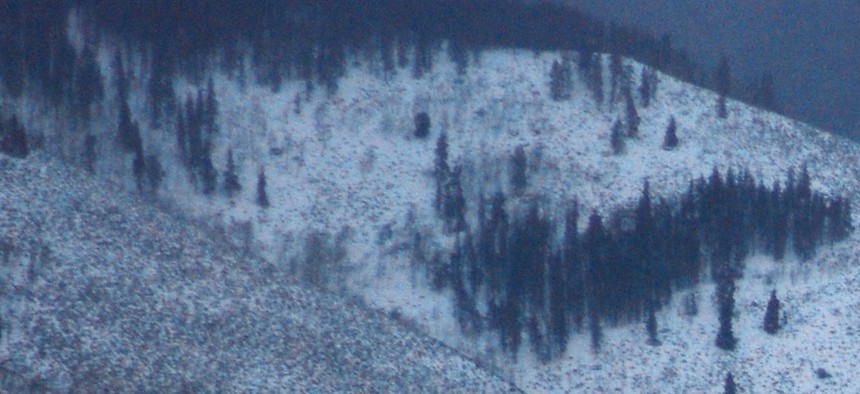Should Colorado Restrict Interstate Truck Traffic to Help Its Ski Industry?

Interstate 70 is the Colorado ski industry's lifeline, but it's often congested. I-70 Coalition
I-70's terrible traffic could drag down mountain resort communities.
VAIL, Colo. — Last spring the mayor of this glitzy ski town high in the Colorado Rockies wondered aloud, after a particularly brutal winter wreaked havoc on the local interstate, whether guests from New York, Dallas and Chicago would keep flocking to the slopes if they encountered big-city traffic once they arrived.
“I think that’s going to begin to hurt Colorado as people look to places that have a great lifestyle and part of that lifestyle is easy access to recreation,” Vail Mayor Andy Daly said. “We’ve got some vulnerability, and if we don’t address Interstate 70, it’s going to be just another competitive disadvantage for Colorado as it tries to compete with the likes of Utah.”
The 100-mile stretch of I-70 between Denver and Vail rises from 5,280 feet and travels west over two high-mountain passes in excess of 10,000 feet. It’s Colorado’s main east-west portal to its $2 billion ski industry, but also a critical interstate trucking route—one that completely shuts down up to 50 times a winter.
One snowy Sunday afternoon in February, drive times that average two hours in decent conditions ballooned to nine hours because of spun-out passenger vehicles and jackknifed semis. Daly noted it took him nearly as long to drive from Denver to Vail as it did to fly from Denver to a ski area in France.
Daly and other local and state politicians say it’s time to seriously consider a commercial trucking ban during peak ski-traffic periods such as Friday and Sunday afternoons, an idea that has the state’s powerful trucking lobby girding for battle.
“While the mayor has made the suggestion to bar trucks during those periods, he has not reached out to us to discuss this matter and better understand the challenges that such a proposal creates,” said Greg Fulton, president of the Colorado Motor Carrier’s Association.
“I-70 is not a local or state road, it is a major interstate highway and one of two major primary thoroughfares for goods and equipment as well as imports and exports to and from the coasts,” Fulton added. “Trying to schedule travel across the entire country around various windows of time … would be difficult, if not impossible."
The Colorado Department of Transportation (CDOT) manages the stretch of I-70 between Kansas and Utah, and would require the approval of the Federal Highway Administration to restrict commercial vehicle traffic during certain periods.
“It’s time to have the truck restrictions conversation we’ve been avoiding in Colorado,” said Melanie Mills, president and CEO of Colorado Ski Country USA, the state’s major ski-industry lobbying group. “Limited truck restrictions have been in place in the Sierras for many years. We think it’s time to take a hard look at whether they could be effective here in Colorado.”
Commercial truck traffic restrictions can be implemented in adverse weather on Donner Pass along Interstate 80 in the Lake Tahoe area of California, but that was part of a deal brokered by stakeholders and state, local and federal officials years ago. Colorado has yet to seek federal permission to limit truck traffic in the mountains along I-70.
A spokeswoman for Colorado Gov. John Hickenlooper said the state’s focus for now is reducing truck traffic during ski season peak periods without implementing the outright ban the governor first broached while campaigning in 2010.
“Last year, despite the impacts of the severe weather on the number of accidents and delays, we instituted several approaches to improve flow,” said Hickenlooper spokeswoman Kathy Green. “One of those was to work closely with commercial vehicles to minimize truck traffic during peak hours. In fact, last winter we reduced truck traffic during the peak travel times by 10 percent.”
Fulton and state officials also point out that private passenger vehicles with bad tires are part of the problem.
“CDOT recorded many incidents in the last year where automobiles spun out and closed a lane where the car had inadequate tires,” Fulton said. “A tougher penalty for automobiles and light-duty vehicles with inadequate tires, similar to those in Oregon, California, and Washington, is clearly needed so that we may reduce this problem.”
Diane Mitsch Bush, the state representative for Vail and surrounding Eagle County, agreed.
“I’m working on a bill that will deal with traction issues and how we better educate and inform and looking at questions of fines and whether they’re adequate,” Mitsch Bush said. “And that’s for passenger vehicles as well as for commercial vehicles Passenger cars are really a part of the problem.”
David O. Williams is a journalist based in Vail.
NEXT STORY: When Schools Can't Get Online





